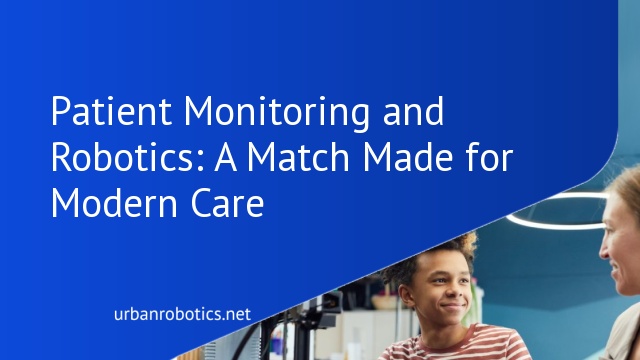Big data and machine learning have revolutionized healthcare, and now artificial intelligence (AI) is poised to take patient monitoring to new heights. With the ability to support healthcare personnel in tasks such as administrative workflow, clinical documentation, patient outreach, image analysis, medical device automation, and patient monitoring, AI-powered robots are set to transform the healthcare industry. The market for AI-associated healthcare is projected to reach USD 6.6 billion by 2021, with a compound annual growth rate of 40%.
By leveraging AI technologies in patient monitoring, healthcare providers can ensure accuracy, efficiency, and superior care. AI algorithms can analyze vast amounts of patient data, identifying patterns and potential risks, allowing for early intervention and personalized treatment plans. This level of precision is crucial in modern care, as it enables proactive and preventive measures.
Furthermore, AI-powered robots can assist healthcare personnel in various tasks, from monitoring vital signs to automating medical devices. These robots can enhance the accuracy of measurements, reduce human error, and free up healthcare personnel to focus on direct patient care.
The synergy between patient monitoring and robotics is evident in the potential for improved patient outcomes and enhanced healthcare delivery. With the advancements in AI and data science, the possibilities for modern care are endless.
The Importance of AI in Healthcare
Artificial intelligence (AI) is poised to revolutionize the healthcare industry, offering advancements in diagnostics, treatment, and patient care. With its ability to enhance human work and automate tasks, AI has a wide range of applications in healthcare. From improving administrative workflows and clinical documentation to facilitating patient outreach and image analysis, AI tools can greatly support healthcare personnel and enhance efficiency. Additionally, AI algorithms can play a crucial role in precision medicine, tailoring healthcare interventions to an individual’s unique needs based on their disease profile, diagnostic information, or treatment response.
Ambient assisted living and machine vision are other important areas where AI can make a significant impact. By harnessing the power of AI, healthcare providers can create smart environments that assist individuals in their daily activities, monitor their health, and provide timely interventions when needed. Machine vision technology enables AI to analyze medical images and detect abnormalities or patterns that may not be apparent to the human eye, helping in early disease detection and accurate diagnosis.
The potential cost savings from AI applications in healthcare are estimated to reach USD 150 billion by 2026. These savings can be attributed to improved efficiency, reduced errors, and better patient outcomes. As AI technology continues to advance, companies like IBM Watson and Google Deep Mind are at the forefront of developing innovative AI solutions for healthcare. With their groundbreaking research and development, AI is expected to transform the healthcare industry, improving patient care and revolutionizing medical practices.
| AI Applications in Healthcare | Benefits |
|---|---|
| Administrative Workflows | Streamlined processes, increased efficiency |
| Image Analysis | Accurate diagnosis, early disease detection |
| Robotic Surgery | Precise and minimally invasive procedures |
| Virtual Assistants | 24/7 patient support, personalized care |
| Clinical Decision Support | Enhanced decision-making, improved patient outcomes |
These are just a few examples of the many AI applications in healthcare. The potential of AI to transform patient care and improve healthcare outcomes is vast. As technology continues to evolve, AI will play an increasingly significant role in training and education for healthcare professionals. Through naturalistic simulations powered by AI and the convenience of AI-enabled smartphones, healthcare professionals can acquire and refine their skills in a more efficient and accessible way. By embracing the potential of AI, we can usher in a new era of healthcare that is more accurate, efficient, and patient-centric.
Technological Advancements in AI and Data Science
The field of AI and data science has witnessed significant technological advances in the past decade. One of the most revolutionary breakthroughs has been in the area of deep learning. Deep learning has enabled AI algorithms to identify complex correlations and patterns that were previously inaccessible. This has been made possible through the development of deep learning neural networks, consisting of millions of artificial neurons. These networks have allowed AI algorithms to surpass human capabilities in various tasks, such as medical image analysis and symptom-biomarker correlation.
Leading companies like IBM Watson and Google Deep Mind have been at the forefront of AI technology development in healthcare. IBM Watson’s cognitive computing system has demonstrated its ability to analyze vast amounts of medical data and provide insightful recommendations for diagnosis and treatment. Google Deep Mind’s AI algorithms have shown remarkable performance in tasks like gaming and medical diagnostics. These technological advancements have the potential to significantly impact the healthcare industry, leading to improved patient outcomes and more efficient healthcare delivery.
Table: Technological Advancements in AI and Data Science
| Technological Advancement | Impact in Healthcare |
|---|---|
| Deep Learning | Enables identification of complex correlations and patterns in medical data, leading to improved diagnostics and treatment planning. |
| Neural Networks | Allows AI algorithms to outperform humans in tasks such as medical image analysis and symptom-biomarker correlation. |
| IBM Watson | Offers cognitive computing capabilities to analyze medical data and provide recommendations for diagnosis and treatment. |
| Google Deep Mind | Uses AI algorithms with remarkable performance in tasks like gaming and medical diagnostics. |
With ongoing research and development in AI and data science, we can expect further advancements that will continue to propel healthcare into the future. These advancements have the potential to transform the way healthcare is delivered, making it more precise, personalized, and efficient. As AI continues to evolve, it will play an increasingly vital role in supporting healthcare providers and improving patient outcomes.
AI Applications in Healthcare
The integration of artificial intelligence (AI) into healthcare settings has opened up a world of possibilities for improving patient care and streamlining administrative workflows. From image analysis to robotic surgery, virtual assistants, and clinical decision support, AI tools are revolutionizing the way healthcare providers operate.
Administrative Workflows
One area where AI is making a significant impact is in administrative workflows. By automating repetitive tasks and analyzing vast amounts of data, AI systems can help healthcare providers streamline processes, reduce errors, and improve overall efficiency. This allows medical professionals to focus more on patient care and spend less time on administrative tasks.
Image Analysis
Another critical application of AI in healthcare is image analysis. AI algorithms can analyze medical images, such as X-rays, MRIs, and CT scans, with a level of accuracy and speed that surpasses human capabilities. This technology enables early detection of diseases, assists in accurate diagnoses, and aids in developing personalized treatment plans.
Robotic Surgery
Robotic surgery, conducted with the assistance of AI-powered robots, is another field where AI applications are transforming healthcare. These robots work alongside human surgeons, providing precision and control, leading to better patient outcomes. Robotic surgery reduces the invasiveness of procedures, minimizes recovery times, and enhances surgical capabilities.
Virtual Assistants and Clinical Decision Support
Virtual assistants powered by AI are revolutionizing patient care by providing real-time support and information to both patients and healthcare providers. These virtual assistants can answer questions, provide medication reminders, offer personalized recommendations, and assist in monitoring patients’ health conditions. Additionally, AI-enabled clinical decision support systems help physicians make informed decisions by analyzing patient data, medical records, and the latest research, allowing for more accurate diagnoses and treatment plans.
In conclusion, AI has immense potential in healthcare, transforming administrative workflows, enabling accurate image analysis, revolutionizing robotic surgery, and providing virtual assistants and clinical decision support. Healthcare professionals can leverage AI tools to improve patient care, enhance efficiency, and ultimately drive better health outcomes.
Robotics in Healthcare
Robotics has made significant advancements in the field of healthcare, offering a range of applications that enhance patient care and improve medical procedures. Medical robots, in particular, have proven to be invaluable in various areas, such as surgery, rehabilitation, end-of-life care, and drug research.
In surgery, medical robots provide surgeons with precision, dexterity, and enhanced visualization, leading to minimally invasive procedures and improved patient outcomes. These robots can assist in complex surgeries, such as cardiac procedures or neurosurgery, by providing steady and accurate movements that human hands may find challenging to achieve. They also offer the advantage of reducing the invasiveness of surgeries, resulting in shorter hospital stays and faster recovery times for patients.
Rehabilitation is another area where medical robots are making a significant impact. These robots assist patients in regaining strength and mobility after injuries or illnesses. They can simulate movements and provide support during physical therapy sessions, allowing patients to regain independence and improve their quality of life. Medical robots used in rehabilitation can track progress, provide feedback, and adjust exercises based on patients’ individual needs, ensuring personalized and effective rehabilitation programs.
Table: Applications of Medical Robots in Healthcare
| Application | Benefits |
|---|---|
| Surgery | – Precision and accuracy – Minimally invasive procedures – Reduced hospital stays |
| Rehabilitation | – Improved strength and mobility – Personalized therapy programs – Enhanced patient independence |
| End-of-life care | – Enhanced patient comfort – Increased independence – Reduced need for hospitalization |
| Drug research | – Streamlined research process – Accelerated drug development – Reduced time to market |
End-of-life care is an area where robotics can bring comfort and support to individuals nearing the end of their lives. Medical robots can provide assistance with daily tasks, monitor vital signs, and offer companionship to patients. By enabling them to remain in their homes or familiar environments, these robots improve the overall experience of end-of-life care and reduce the need for hospitalizations or prolonged stays in care facilities.
Furthermore, medical robots play a crucial role in drug research and development. They can perform repetitive tasks, automate laboratory processes, and analyze vast amounts of data, allowing for more efficient and accurate drug discovery. By streamlining the research process, medical robots contribute to faster development and delivery of life-saving medications, benefiting patients around the world.
With ongoing advancements in robotics and AI, the potential for medical robots in healthcare is vast. They continue to revolutionize various aspects of patient care, from surgical precision to rehabilitation support, end-of-life comfort, and drug discovery. As technology continues to evolve, medical robots will undoubtedly play an even more significant role in shaping the future of healthcare.
AI in Training and Education
AI is playing a transformative role in the field of healthcare training and education. One of the key applications is through naturalistic simulations, which provide trainees with realistic scenarios to enhance their decision-making and problem-solving skills. These simulations, powered by AI algorithms, adapt to the trainee’s responses and continually adjust the challenges to meet their learning needs. By immersing trainees in lifelike situations, AI-driven simulations create a dynamic learning environment that replicates real-world experiences.
Furthermore, AI-enabled smartphones are revolutionizing healthcare training and education by making learning more convenient and accessible. Trainees can now access training materials, resources, and interactive modules anytime, anywhere. AI algorithms embedded in smartphones facilitate personalized learning experiences, allowing trainees to have quick catch-up sessions and continuous learning on the go. This integration of AI in training and education is transforming the way healthcare professionals acquire and refine their skills, ensuring they stay up-to-date with the latest advancements.
In conclusion, the combination of naturalistic simulations and AI-enabled smartphones is revolutionizing healthcare training and education. With the help of AI, trainees can immerse themselves in realistic scenarios that challenge their skills and decision-making abilities. Additionally, AI-enabled smartphones make learning accessible and flexible, allowing trainees to learn at their own pace and convenience. As AI continues to advance, we can expect further enhancements in training and education, ultimately leading to better-prepared healthcare professionals and improved patient care.





